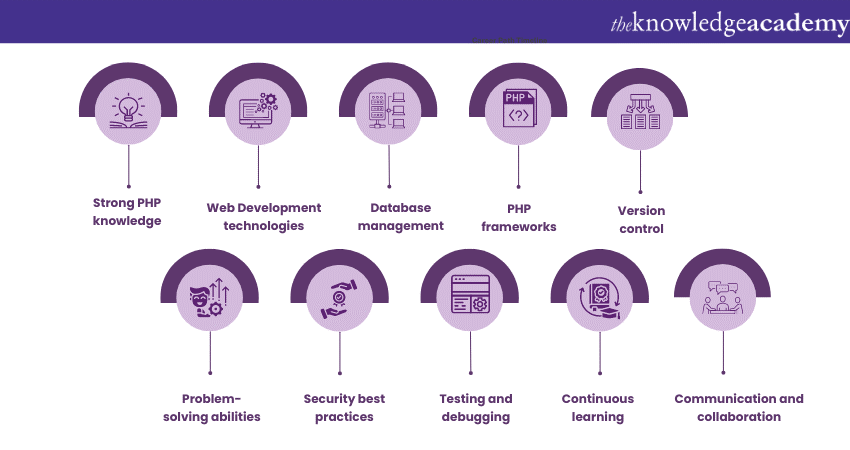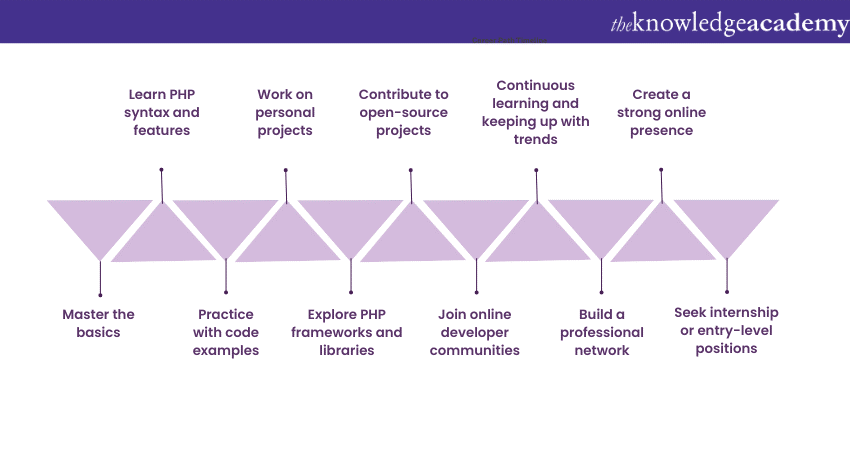We may not have the course you’re looking for. If you enquire or give us a call on + 1-866 272 8822 and speak to our training experts, we may still be able to help with your training requirements.
We ensure quality, budget-alignment, and timely delivery by our expert instructors.

Web Development has become an integral part of businesses and organisations in the modern digital era. One popular programming language for Web Development is PHP (Hypertext Preprocessor). With PHP being on an exponential upward curve in terms of use and popularity, many people often ask the question, “What is PHP Developer?”
According to Glassdoor, a PHP Developer in the United Kingdom earns an average salary of £46,000. With the prevalence of PHP on the rise and a lucrative pay on offer, many aspiring professionals often ask about what a PHP Developer actually is. This blog will tell you all about What is PHP Developer and how to become a PHP Developer in 2024. Read more to find out!
Table of Contents
1) What is a PHP Developer?
2) Requirements to be a PHP Developer
3) How to become a PHP Developer?
4) Advantages of being a PHP Developer
5) Challenges of being a PHP Developer
6) What is the average salary of a PHP Developer?
7) Conclusion
What is a PHP Developer?
Before we delve into knowing who is a PHP Developer, we will first explore What is PHP. PHP, which stands for Hypertext Preprocessor, is a versatile and widely used scripting language primarily designed for Web Development. A PHP Developer is an individual who possesses the expertise and skills to work with the PHP programming language. PHP Developers play a crucial role in creating dynamic and interactive websites that deliver a seamless user experience.
These professionals are proficient in writing server-side web application logic using PHP. They utilise their knowledge and understanding of PHP syntax, functions, and frameworks to build the backend of websites and web applications. By leveraging PHP, developers can handle data processing, form validation, database interactions, and other server-side functionalities that power the functionality of a website. PHP Interview Questions can help you assess your knowledge and prepare for technical interviews.
A PHP Developer's responsibilities go beyond writing PHP code. They often collaborate with designers, front-end developers, and other stakeholders to comprehend project requirements and translate them into practical solutions. They work with HTML, CSS, and JavaScript to ensure the integration of front-end elements with the backend logic.
Want to master PHP Programming and build dynamic websites? Join our PHP Programming Training Course now!
Requirements to be a PHP Developer
This section of the blog will focus on the requirements to be a PHP Developer, including the skills required as well as the educational requirements.
Skills required to be a PHP Developer
To be a proficient PHP Developer, you need the following skills:

1) Strong PHP knowledge: A thorough understanding of PHP syntax, functions, features, and tools like PHP cURL is crucial.
2) Web Development technologies: Proficiency in HTML, CSS, and JavaScript is essential for creating engaging and interactive web pages.
3) Database management: Knowledge of database systems, such as MySQL, enables effective data handling and storage.
4) PHP frameworks: Familiarity with popular PHP frameworks like Laravel or Symfony streamlines development processes.
5) Version control: Experience with version control systems facilitates collaborative coding.
6) Problem-solving abilities: Strong problem-solving skills help troubleshoot and debug code effectively.
7) Security best practices: Awareness of common security vulnerabilities and the ability to implement preventive measures is crucial.
8) Testing and debugging: Proficiency in testing methodologies and debugging tools ensures high-quality code.
9) Continuous learning: Keeping up with emerging trends and updates in PHP and Web Development is essential.
10) Communication and collaboration: Proper communication and collaboration skills are key for teamwork and client interaction.
Educational requirements
When considering the educational requirements for becoming a PHP Developer, there are certain pointers to keep in mind:
1) Formal education: While not always mandatory, having a degree in computer science provides a solid academic foundation. Such programs cover essential topics like programming languages, algorithms, data structures, and Web Development principles.
2) Broad understanding: A degree in computer science equips students with a broader understanding of computer science fundamentals. This includes a comprehensive grasp of programming concepts and principles that are applicable to PHP development.
3) Practical experience: Practical experience is invaluable for PHP Developers. Engaging in internships, co-op programs, or personal projects allows aspiring developers to apply their knowledge and gain hands-on experience with PHP development.
4) Continuous learning: The field of PHP development is constantly evolving. Keeping up with the latest frameworks, tools, and best practices is crucial. PHP Developers should have a growth mindset and actively seek out opportunities for continuous learning, such as online courses, workshops, and industry conferences.
5) Hands-on projects: Building real-world projects is an effective way to solidify PHP development skills. Contributing to open-source projects or working on personal projects allows developers to gain practical experience and showcase their abilities to potential clients or employers.
6) Self-study: In addition to formal education, self-study is essential for PHP Developers. They should explore online resources, tutorials, and documentation to stay updated with new PHP features, frameworks, and coding standards.
How to become a PHP Developer?
This section of the blog will tell you all you need to know about how to be PHP Developer.

1) Master the basics: Start by gaining a strong understanding of the basics of programming. Familiarise yourself with concepts like variables, data types, conditional statements, loops, and functions. This foundation will provide a solid starting point for learning PHP.
2) Learn PHP syntax and features: Dive into PHP and grasp its syntax and features. Understand how to write PHP code, declare variables, manipulate strings and arrays, work with functions and classes, handle form submissions, and interact with databases. Online tutorials, PHP documentation, and interactive coding exercises can be valuable resources for learning PHP.
3) Practice with code examples: Enhance your skills by practising with code examples. Implement small programs and scripts to reinforce your understanding of PHP concepts. Experiment with different PHP functionalities, such as file handling, sessions, cookies, and error handling. The more you practice, the more comfortable you will become with PHP coding.
4) Work on personal projects: Undertake personal PHP projects to apply your knowledge and gain experience. Start with simple projects like building a basic contact form or a blog application, and gradually take on more complex projects. This practical experience will help you strengthen your problem-solving skills and understand the real-world challenges of PHP development.
5) Explore PHP frameworks and libraries: Familiarise yourself with popular PHP frameworks and libraries that streamline the development process. Frameworks like Laravel, Symfony, and CodeIgniter provide a structured approach to building web applications, while libraries like PHPUnit and Composer enhance testing and dependency management. Experiment with these tools to understand their benefits and how they can expedite PHP development.
6) Contribute to open-source projects: Engage with the PHP Developer community by contributing to open-source projects. Collaborating on open-source projects allows you to work alongside experienced developers, gain valuable feedback, and improve your coding skills. It also provides an opportunity to display your expertise and make a positive impact on the PHP community.
7) Join online developer communities: Participate in online PHP Developer communities, such as forums, discussion boards, and social media groups. Ask questions, engage in discussions, and exhibit your knowledge. Networking with other developers not only expands your learning opportunities but also exposes you to different perspectives and approaches to PHP development.
8) Continuous learning and keeping up with trends: Stay up to date with the latest trends and advancements in PHP. Follow reputable blogs, subscribe to PHP newsletters, and explore online resources regularly. PHP evolves rapidly, with new features, security updates, and best practices being introduced. By staying informed, you can enhance your skills and remain relevant in the PHP development landscape.
9) Build a professional network: Attend local meetups, conferences, and networking events focused on Web Development and PHP. These events provide opportunities to connect with industry professionals, share experiences, and gain insights into the PHP job market. Building a professional network can lead to job opportunities and collaborations.
10) Create a strong online presence: Establish an online presence by making a personal website or blog where you can showcase your PHP projects, share coding tutorials or tips, and demonstrate your expertise. Actively engage with the developer community through social media platforms and contribute to relevant online discussions.
11) Seek internship or entry-level positions: Look for internships or entry-level positions that allow you to apply your PHP skills in a professional setting. The practical experience will help you refine your abilities, work as part of a team, and gain exposure to real-world development projects.
Advantages of being a PHP Developer
Being a PHP Developer offers several advantages in the field of Web Development. Here are some key advantages:
1) Wide adoption and community support: PHP is one of the most widely used languages when it comes to Web Development. It powers a significant portion of websites on the internet, making it a valuable skill to have. The large PHP Developer community provides abundant resources, frameworks, libraries, and forums for support, collaboration, and learning.
2) Versatility and compatibility: PHP is compatible with various operating systems (Windows, Linux, macOS) and can run on multiple web servers (Apache, Nginx). It seamlessly integrates with popular databases like MySQL, making it flexible for different project requirements. Moreover, PHP can be embedded within HTML code, allowing developers to create interactive and dynamic pages.
3) Rapid development: PHP's simplicity and ease of use contribute to rapid development. Its vast ecosystem of frameworks (e.g., Laravel, Symfony) and libraries empowers developers to streamline common tasks and focus on building features rather than reinventing the wheel. This accelerates the development process and allows developers to deliver projects more efficiently.
4) Open-source nature: PHP is an open-source language, meaning it is freely available, and developers can contribute to its development. This fosters a collaborative environment where developers can leverage open-source projects, contribute to their improvement, and learn from others' code. Open-source PHP projects provide opportunities for developers to showcase their skills, collaborate, and gain recognition within the community.
5) Scalability and performance: PHP can handle high-traffic websites and scale as needed. With proper optimisation and caching techniques, PHP applications can achieve excellent performance. Additionally, the introduction of PHP 7 and later versions significantly improved performance, reducing response times and enhancing the overall user experience.
6) Abundance of job opportunities: Due to the widespread adoption of PHP, there is a constant demand for skilled PHP Developers. Various industries, including e-commerce, media, finance, and healthcare, require PHP expertise to build and maintain their web applications. The availability of job opportunities and freelance projects provides PHP Developers with a range of career options.
7) Cost-effectiveness: PHP being open-source eliminates the need for expensive licenses, making it a cost-effective choice for businesses. Furthermore, hosting PHP applications on affordable and widely available hosting platforms adds to the cost efficiency. The lower development and maintenance costs associated with PHP contribute to its popularity among businesses of all sizes.
8) Continuous evolution and community contributions: PHP has evolved significantly over the years, addressing security concerns and introducing modern features. The PHP community actively contributes to the language's development, ensuring its relevance and competitiveness in the rapidly changing Web Development landscape. By staying connected to the PHP community, developers can learn from best practices, security updates, and emerging trends.
Challenges of being a PHP Developer
While being a PHP Developer offers numerous advantages, there are also certain challenges that PHP Developers may encounter. Here are some key challenges:
1) Debugging complex code: PHP applications can become complex as they grow in size and functionality. Debugging and troubleshooting such codebases can be challenging, especially when dealing with intricate logic, multiple dependencies, and interacting components. PHP Developers must possess strong problem-solving skills and attention to detail to effectively identify and resolve issues.
2) Security vulnerabilities: Like any Web Development language, PHP is not immune to security vulnerabilities. PHP Developers need to stay updated on the latest security practices and be vigilant in implementing secure coding techniques. Handling user input securely, preventing SQL injections, validating data, and protecting against cross-site scripting (XSS) and cross-site request forgery (CSRF) attacks are critical considerations.
3) Performance optimisation: Building high-performing PHP applications requires careful consideration of factors such as database queries, caching mechanisms, file handling, and code efficiency. Optimising PHP code and database queries to reduce response times and handle large user traffic can be a challenge. PHP Developers need to be proficient in performance profiling and optimisation techniques to ensure optimal application performance.
4) Adapting to rapidly changing technologies: The Web Development landscape, including PHP, constantly evolves. New PHP versions, frameworks, libraries, and coding standards emerge frequently. PHP Developers must stay updated with the latest trends and technologies to remain competitive. This requires continuous learning, exploring new tools, and upgrading existing projects to keep pace with industry advancements.
5) Code maintenance and legacy systems: PHP Developers often encounter legacy codebases that require maintenance or updates. Understanding and refactoring existing code can be time-consuming and complex, especially if the code lacks proper documentation or adheres to outdated practices. PHP Developers must navigate legacy systems and find efficient ways to enhance functionality without introducing additional issues.
6) Dealing with burstiness: PHP web applications may experience sudden spikes in traffic, especially during high-demand periods or promotional events. Scaling and handling such bursty traffic can pose a challenge. PHP Developers need to employ effective caching strategies, load-balancing techniques, and cloud infrastructure solutions to ensure the application can handle increased loads without compromising performance or availability.
7) Continuous learning and keeping up: The fast-paced nature of PHP development demands constant learning. Staying updated with new PHP features, frameworks, and tools requires dedication and effort. PHP Developers must allocate time for self-study, attend workshops or conferences, and actively engage with the PHP Developer community to stay abreast of industry advancements

What is the average salary of a PHP Developer?
A PHP Developer's average salary is decided by different factors such as location, experience, industry, and company size. However, PHP Developers generally earn competitive salaries in the field of Web Development.
In the United Kingdom, the average salary for a PHP Developer ranges between £29,000 and £46,000 per year. With several years of experience and expertise in PHP frameworks and advanced Web Development concepts, senior PHP Developers can earn salaries exceeding £73,000 per year. These figures may vary in different regions within the UK, with higher salaries often offered in major cities such as London.
The salary range for PHP Developers also depends on the industry in which they work. Sectors such as finance, e-commerce, and technology tend to offer higher salaries due to the criticality of the web applications involved. Startups and small companies may offer lower salaries but provide opportunities for growth and learning.
Conclusion
All in all, becoming a PHP Developer in 2023 opens up a world of opportunities in the field of Web Development. By acquiring the skills necessary, gaining practical experience, building a strong portfolio, and staying updated with industry trends, you can position yourself for success in this rewarding career path. Remember to continuously learn, adapt to new technologies, and nurture both your technical and soft skills to thrive as a PHP Developer. Hope this blog told you all you need to know about What is PHP Developer!
Unlock your coding potential with our Computer Programming Courses. Sign up today and embark on your journey to becoming a skilled programmer!
Upcoming Programming & DevOps Resources Batches & Dates
Date
 PHP Course
PHP Course
Thu 3rd Apr 2025
Thu 8th May 2025
Thu 10th Jul 2025
Thu 18th Sep 2025
Thu 6th Nov 2025






 Top Rated Course
Top Rated Course


 If you wish to make any changes to your course, please
If you wish to make any changes to your course, please


